#and its out of print. its another book i think i found on archive.org then wanted a print copy of
Text
i have... a penchant... for getting really into books which are out of print. not cause they’re like first editions or collectibles or whatever the fuck (i went to an antique book show recently and was SO pissed there was like 50 Alice in Wonderlands, but no 1900 printed french books you couldn’t even find in pdfs online... in fact, no foreign language books at all what the fuck :c... and 2 gone with the winds, 50 lord of the rings... like i get it, the target audience of an antique show is maybe? idk people collecting expensive books? but for me? the point was to find out of print old books that may never have been digitized. thank the universe for archive.org there’s so many 1800s learn japanese, 1900s learn chinese books with different versions of romanization and then later different amounts of character simplification, theres the ‘nature method’ textbooks that i’ve only seen back in print very recently and only for a few languages and probably only cause nerds like me can’t shut up about them, there’s so many BOOKS i’m into that just... :c good fucking luck finding them if not for the kind efforts of archivists or random chance)
#rant#like. god even kamikaze girls??? a RECENT novel. a novel with a MOVIE#and its like... seems to have only had one print run or whatever#u can find it used. sometimes. thats it#and like ive been trying to find novalas other novels? hhaha i cant even find them used. they're out of stock.#and then like. there's this AMAZING japanese book called Japanese in 40 Hours.#a HERO made a video series of the chapters on youtube i recommend looking at it. and its on archive.org thank fuck#but its basically i think the BEST sparksnotes basic primer for western speakers to begin learning japanese#its quick. it gives a solid foundation of grammar and word endings before throwing u into kana. and its faster paced then a LOT of modern#books ive used.#theres a chinese book called Chinese Grammar by the Nature Method.#i believe the author is Thimm. it was published in like 1929. it is all#traditional characters. its like 300 very compact pages. its a very beautiful small book.#it has a HUGE hanzi dictionary in the back. it is THOROUGH in its grammar explanations and SO easy to understand.#its my favorite chinese grammar book by far. and the sheer VOLUME of words in it#make it a good overall book#not just for grammar but also words. the only weird thing is the old romanization system but once u recognize the hanzi u can#match them to modern pinyin you know better. and just? it is SUCH a good book#even with the outdated bits (like NIN used a lot and le pronounced liao in a lot of spots we'd now use le)#and its out of print. its another book i think i found on archive.org then wanted a print copy of
2 notes
·
View notes
Text
423. The Chevy Chase Show, September 9, 1993.
The other day, I ran across this video from YouTube user VideoDisorder that discussed the first episode of the Chevy Chase Show. He hit all the same points I hit when I wrote my entry about Chevy’s extremely short lived talk show from 1993. I loved his video so much that … that I had to watch another episode of Chevy’s show. I just really have the craving to tear down another episode.
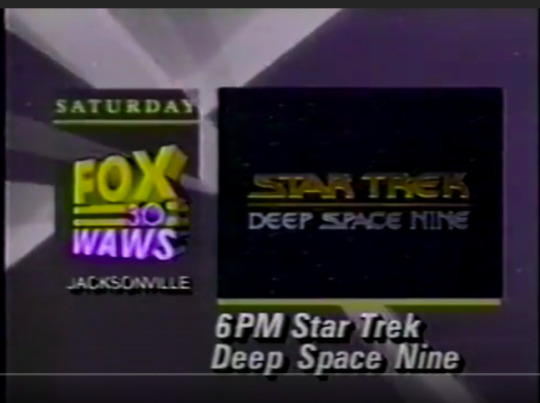
I’m watching night three of Chevy’s show, September 9, 1993 . I chose this one primarily because our boy, Harry Anderson from Night Court and Dave’s World was in it.

Also, I had a dream a few weeks ago that Harry and I were community college students who were married and lived in the huge money pit house my parents and I moved into my senior year of high school. Seemed fitting.
The show opens with Chevy putting on a wig, which kinda makes him look like he did at the beginning of the Christmas Vacation movie. (Clip: youtube.com/watch?v=ozksR8QLWzM) Just me? ok.

Oh, but no, there’s a baby in it! Harry’s gonna staple gun it on for Chevy.

Chevy still thinks it’s funny to fall and stumble into his opening … its night three, Chevy. Stop it. He also tries to make a basketball hoop just like he did on night one. Was that supposed to be a tradition? A reference to the Fletch movie? The modern equivalent to this would be on Good Mythical Morning when Rhett and Link do a tournament and Link always misses throwing away the bad food behind his back into the trash can. (Tiny print: man they’ve been doing that too much, but ANYWAY)
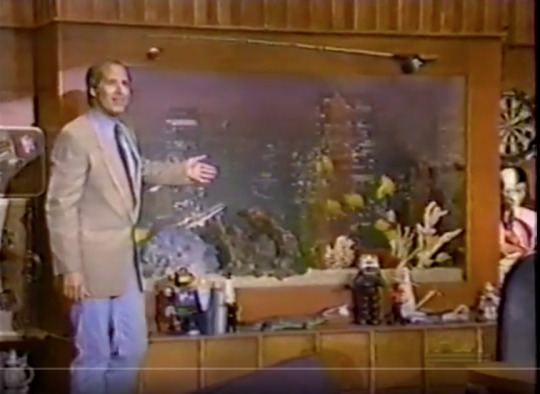
Chevy does a tour of the set, which he shoulda done the first night instead of that birthday cake bit with Goldie Hawn’s son. He shows off the aquarium….oh that reminds me of something I found last night!! I went to see if I could find anything about the show on The Internet Archive (archive.org). I found this article from this small down paper about high schooler’s thoughts on the late night wars of 1993 1.

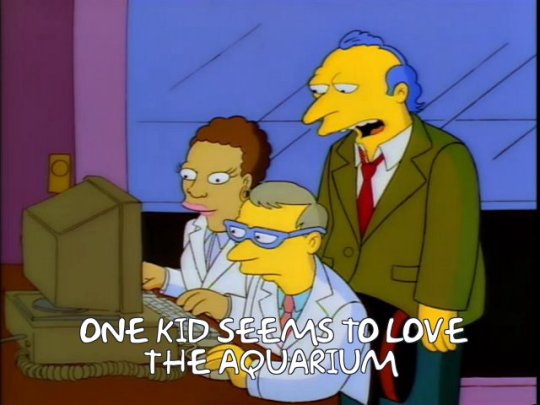
Chevy flubbed his lines through the entire segment. He said the guest book passport thing was there to “Keep his guests from coming back” by accident. Tell us what you really feel, Chevy. Someone in the audience even heckled him!
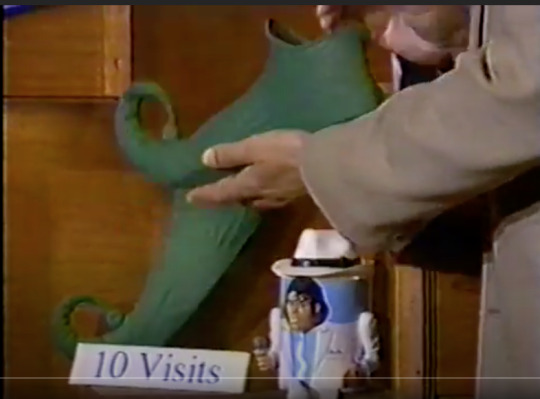
Chevy: …they get some sort of prize..
Audience Member: LIKE WHAT?!
Chevy: The first prize would be trying to get you out of her in a fashion that wouldn’t be too exciting.
On your tenth visit (okay) you could get Michael Jackson in a can. Audience boos. This was a couple of weeks after the beginning of the claims that Michael had molested a boy.
Chevy then goes into a segment where he goes to a desk company to look for his desk. They got to visit the desk from Barbarians at the Gate! Something I’ve been meaning to watch for years. Tyre’s also dumb jokes about Chevy putting gum under a desk, and then retrieving it. The man at the desk warehouse said “ew”. He wasn’t playing, straight up “ew”. I had to stop it at that point. Zzz city.
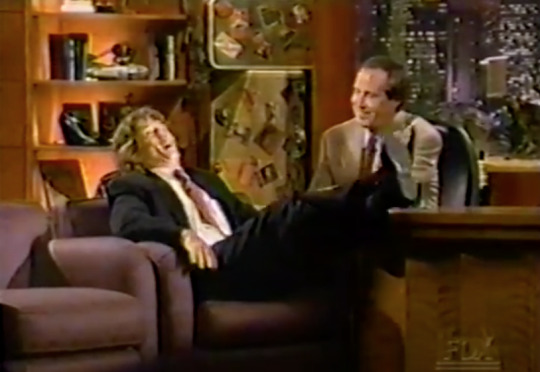
A dramatic recreation of Martin getting Nair put on by makeup ladies.
Martin Short is the first guest of the night. They sing a song from Three Amigos and its cute. Martin has a full head of fuzzy hair. It’s glorious. The interview is not. I caught myself reading the news on my phone during it. At one point, Martin says, “I will imagine my own death, and imagine people hearing the news.” Later on he discusses being in the movie Clifford and how he had Nair his legs, and he got the makeup crew to help him. Turns out he had his “little fella” hanging out of his underwear the whole time.
The News Update segment is awful. He tried to tell a joke about the rampant killings of tourists in Florida at the time:
“The two white men in Florida who were charged [stumbles] on all accounts of setting black men on fire were convicted … that’s it… the two men could face two life terms, or a stiffer sentence of driving a rental car through Miami dressed as German tourists.”
(Crowd groans, someone in the audience even said, “NOPE!”)
He also calls Snoop Doggy Dogg, “SNOOPS Doggy Dog”. How is he stumbling through everything like this.
On inhalant abuse, especially with aerosol deodorant:

“These are you underarms on drugs”
FINALLY, we get to Harry! This was right before Dave’s World started, where Harry played writer Dave Barry. Harry describes Dave’s books as “books you read on a plane”, and his newspaper column, “as something you read on the crapper”.

Why do I remember the bathroom from Dave’s World so well! I loved that house.

“Was that your card?”


NO. They brought this stupid segment back from the first night. I don’t know what this even IS. It’s not funny, I know that. I read in Chevy’s biography by Rena Fruchter that these were all his faces. 2

“I love Harry Anderson, I love all of you. Goodnight.”
Facebook | Etsy | Retail History Blog | Twitter | |YouTube Playlist | Random Post | ko-fi donation | Instagram @ thelastvcr | other tumblr
“Late Night Battle Begins” Romulus Roman, September 26. 1993. https://archive.org/details/Romulus091993/09-22-1993/page/n21/mode/2up
Fruchter, Rena. I’m Chevy Chase-- and You’re Not: The Authorized Biography. London: Virgin, 2007. 154.
Related: Unearthing the Complete and Total Disaster That Was ‘The Chevy Chase Show’ By Roger Cormier
9 notes
·
View notes
Text
A Pearl of Great Price - 14x13 Lebanon
Well, Supernatural’s 300th episode was SO affectingly emotional. And beautifully so.
But what exactly is up with that magic pearl in 14x13 Lebanon?
Continuing my meta series on the Jungian themes of S14 (have I mentioned how much I LOVE S14?) I’m going to talk about the significance of the Baizhu, the heart’s desire granting pearl of the episode, as the pearl of great price.
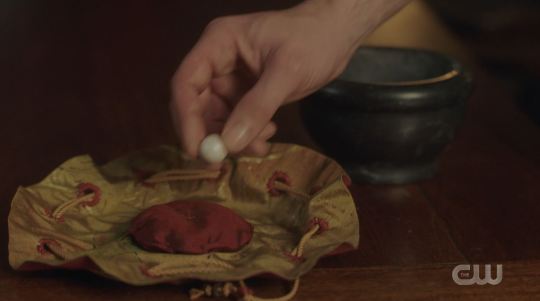
In particular I’m going to talk about the pearl as holding special significance as the object which permits Dean to confront (and make peace with) the ghost of John Winchester. The pearl helps to move on Dean’s psychological haunting by an internalised construct of his father, which has oppressed and repressed him for so long - part of the Jungian Shadow-work of the season.
So, why was a pearl the magical object chosen to grant Dean’s wish-of-the-heart, thus altering the time-lines to resurrect John Winchester?
Pearls have significance in the Bible as metaphors for Heaven, because of their beauty and value...
In Revelations, the gates of Heaven are made of pearls, hence the pearly gates. And in the parable of the pearl, the “pearl of great price” is commonly interpreted to represent Heaven:
”Again, the kingdom of heaven is like unto a merchant man, seeking goodly pearls: Who, when he had found one pearl of great price, went and sold all that he had, and bought it.”
— Matthew 13:45-46,
King James Bible
So, the pearl grants Dean’s wish for what he had long imagined as a kind of Heaven - his original family, Mom, Dad, Sam and himself, all together again.
But, as with most wish stories (and I’m sure @prairiedust will be writing a great meta about fairytales and wishes) - be careful what you wish for is the maxim here.
Because Dean finds that the price the pearl exacts is too high.
If they accept the world the pearl has delivered, he and Sam will, eventually (as the timelines course correct) no longer be hunting together. Sam will be a lawyer and a kale-eating motivational speaker (a hilarious nod to Tom Cruise’s dick character in Magnolia) and Dean will be on the FBI’s “most wanted” list again. They will be separated. Neither will the brothers have the gift of their mother’s return, because Mary will never have been resurrected by Amara. Additionally, their adopted Nephilim son Jack will not exist, because Lucifer (presumably) will remain in the Cage. And finally, Castiel will not have escaped his endless obedience mind-wipes in Heaven, thanks to his transformational encounter with Dean, starting with the raising of the elder Winchester from perdition. Instead, Cas will stand at that dick-in-Heaven functionary Zaccharia’s side, and will neither know nor love the Winchesters. He will still belong to Heaven (and not to Dean).
So, the pearl can be understood as the pearl of great price, because the price the pearl requires is simply too great, and the “Heaven” it offers is a false one.
Dean chooses (with Sam’s full assent) in the end, all the pain, all the suffering of his and Sam’s lives, including his 40 years in Hell and Sam’s agony in the Cage with Lucifer, because that journey has brought them to who and where they are now. Dean chooses the found family that their journey has brought, not the (impossible) fantasy family of his boyish imaginings.
JOHN: (to Sam and Dean): “And now you live in this secret bunker, with an angel and Lucifer’s kid?”
later....
JOHN (to Dean): “I guess that I’d hoped eventually that you would… get yourself a normal life, a peaceful life, a family…”
DEAN: “I have a family.”
(And oh boy is that ever the kind of conversation that happens between a hetero-normative parent and their queer kid - but that’s another meta).
However, there’s more, because as well as representing too great a price, and a false Heaven, thanks to its Biblical associations, the wish-granting pearl in Lebanon also links to the season’s Jungian themes.
A pearl has also (I argue) been chosen by Dabb and Glynn as the episode’s wish-granting object, because of that object’s connection to alchemy.
Jung’s key interpretive understanding of the mystical pseudo-science of alchemy, is his revelation that the transformation of matter in medieval alchemical texts can be understood as representative of the (potential for) the soul’s psychological journey towards greater self-actualization.
“The alchemical operations were real, only this reality was not physical but psychological. Alchemy represents the projection of a drama both cosmic and spiritual in laboratory terms. The magnum opus had two aims: the rescue of the human soul and the salvation of the cosmos. What the alchemists called ‘matter’ was in reality the [unconscious] self...”
Carl Jung in Speaking: Interviews and Encounters ( p228) (in a 1952 interview with Mircea Eliade).
Here is one of the earliest printed books on alchemy (originally 1546, by the reputed alchemist Bonus Ferrara, but translated into English, as here, in 1894):
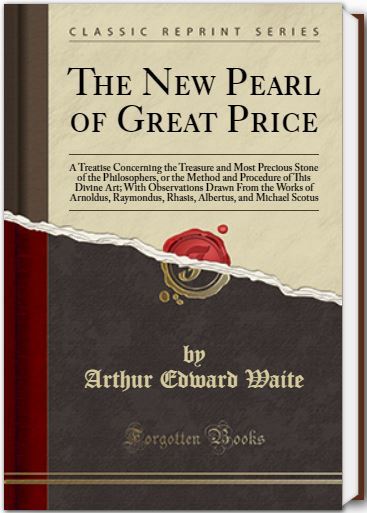
You can actually read a copy of the translated text itself here:
https://archive.org/stream/newpearlofgreatp00laciiala/newpearlofgreatp00laciiala_djvu.txt
The “pearl of great price” is another name for the “Philosopher’s Stone”. On a material level, in alchemy, this is the supposedly mystical and magical substance which could turn base metals like mercury into gold. So alchemical texts, like Bonas’ one above, read in part as weird chemistry recipe books. But, on a metaphorical level, this chemistry was understood (in Bonas’ book and elsewhere) as analogous to the soul’s journey to God:
“The Sages represent the Stone as bearing the same relation to the metals which is borne by form to substance, or, soul to body.”
Jung takes that Christian interpretation of alchemy (made by correspondence of the world below with the world above) and transmutes it into a psychological one. For Jung, the alchemical work is the work which psychoanalysis can assist a person with - the work of facing and integrating with one’s Shadow self.
My previous series of meta on S14 and the Shadow is here:
http://drsilverfish.tumblr.com/post/180906003584/the-shadow-14x08
http://drsilverfish.tumblr.com/post/181122764984/14x09-the-spear-jungian-decoder-ring-edition
http://drsilverfish.tumblr.com/post/182299438269/jung-and-deans-journey-towards-self-integration
http://drsilverfish.tumblr.com/post/182486474324/ouroboros-in-prophet-and-loss-14x12
So, how does the episode’s pearl of great price (aka the Philosopher’s Stone, aka the mystical substance which makes possible the soul’s journey to God, aka, according to Jung, that which makes possible profound psychological progress) happen for Dean, in particular, in Lebanon (given that he was the one whose wish the pearl granted in the first place)?
Well, Dean has been running from an internalised psychological construct of his father, a haunting by John Winchester’s ghost, if you will, for a very long time.
The opening sequence to 14x13 Lebanon is key in recognising this. Because one of the flashbacks we get is to 14x04 Mint Condition, in which Dean confronts the ghost of “Hatchet Man”.
Here is the 14x13 Lebanon flash-back at the start of the ep. Dean, with the axe:

confronts the ghost of the comic store owner, animating the life-size model of “Hatchet Man”:

As my meta on Mint Condition made clear at the time,
http://drsilverfish.tumblr.com/post/179735406854/batman-vs-superman-connection-and-conflict-in
the episode, “...invites us to see Stuart’s conflict with the ghost of his father-figure, the comic store owner, as a mirror for Dean’s conflict with the ghost of his own father, for whom AU Michael (in the narrative arc of S14) acts as a mirror (AU Michael = John Winchester = Dean’s own internalised repression via the metaphor of Dean’s “drowning” possession by Michael).”
That the psychological construct of the ghost of John Winchester has been a very repressive internal construct, for Dean, is further symbolised in S14 both by Dean locking AU!Michael in a closet in his mind AND by the Ma’lak box Dean has built and has been intent on locking himself inside for all eternity.
Just to re-emphasise this, the opening sequence of 14x13 also shows us AU!Michael once again banging on the doors of Dean’s mind-closet:

Dean repressed a lot of himself in order to be a “good little soldier” for his Dad, in order to try and be the parent for Sam that his Dad was manifestly failing to be, and in order to embody the kind of (straight) masculinity he thought his father approved of.
So we can think of John in 14x13 Lebanon as partly representing the opportunity (at last) for Dean to confront that internal “ghost of John Winchester”, i.e. for Dean to confront a part of himselfL

When Dean is able to hear his father tell him he is proud of him, when Dean is able tell his father, out loud, that he loves him, when Dean is able to tell his father that he has a found family that includes Castiel and Jack, when Dean is able to tell Sam out loud (as a result of his encounter with his father) this:
DEAN: “Look, we’ve been through some tough times, there’s no denying that, and for the longest time, I blamed Dad. I mean, hell, I blamed Mom too, y’know, I was angry. But, say we could send Dad back, knowing everything, why stop there? Why not send him even further back, and let some other poor sons of bitches save the world? But, here’s the problem? Who does that make us? Because I gotta be honest. I don’t know who that Dean Winchester is. And I am good with who I am...”
that is Dean being able to tell himself all those things:
I am proud of you
I love you
I have a “found family” whom I love
I am good with who I am.
Jung tells us that the more we run from the Shadow, the more its terrifying haunting power over us grows. It is only when we turn and confront it, and embrace it (as the repressed parts of ourselves) that we can achieve psychological growth.
As I said in my meta last week on “The Riddle of the Sphinx” in 14x12 Prophet and Loss:
“The Jungian solution, which the S14 narrative is offering to the metaphorical Riddle of the Sphinx, is, to turn around and embrace the Shadow-self (the parts of oneself one has repressed) and in so doing, to evolve - to become more fully human.
http://drsilverfish.tumblr.com/post/182482293379/the-riddle-of-the-sphinx-14x12-prophet-and-loss
The pearl of great price in 14x13 Lebanon, in symbolising the transformative alchemical power of the Philosopher’s Stone, has enabled Dean, in confronting and embracing the ghost of his father, to undertake some powerful Shadow-work. Shadow-work that will, eventually, help him to defeat both the repression locker in his mind where AU!Michael resides and the eternal repression locker represented by the Ma’lak box.
#Supernatural#SPN meta#14x13#Lebanon#The ghost of John Winchester#Jung in S14#Dean vs repression#Dean is bisexual#Still subtext#Meta
192 notes
·
View notes
Text
Text Adventure Review: “Border Zone”
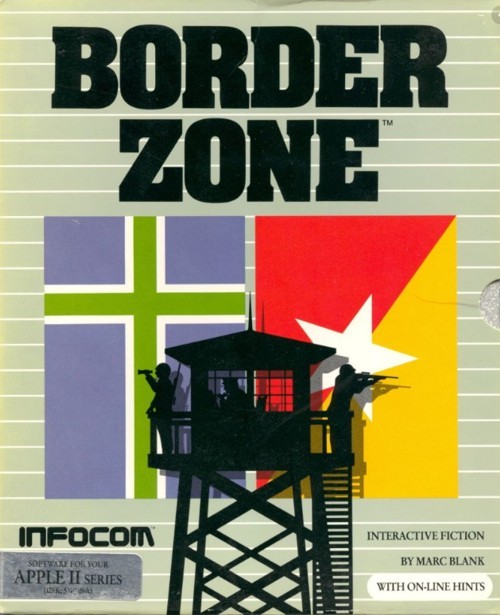
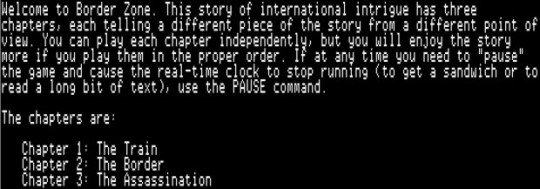
The main reason I'll probably need to pause the game is to masturbate when I meet the sexy double agent and type, "Fuck sexy double agent then fall asleep".
In the picture above, try not to read the three chapter titles because there's a spoiler in the third one that says "The Assassination." I'm going to forget that's a plot point and start playing "Chapter 1: The Train" because Marc Blank suggested that's what I do.
CHAPTER ONE
The protagonist (that's you! The person you play in the game! Or it's me! I'll probably go back and forth using first and second person pronouns so please don't be confused by my amateurish writing style) is just a regular non-spy person who does a little importing and exporting across the Iron Curtain. This game is from 1987 so nobody remembers what the Iron Curtain is anymore. It really wasn't that important anyway, at least not to those of us living on the Western side of it and never had to really think about its implications on the people trapped on the Eastern side of it. Am I supposed to have enough time and compassion to worry about the state of other peoples' worlds when I can barely keep my world from disintegrating?! If you want Levi's, people dumb enough to be born in countries annexed by the USSR after World War II, maybe you should have thought about that up in heaven when God was asking you what uterus you wanted your soul implanted in! Idiots.
The train story begins, as all good espionage train stories do, with a probably dying secret agent breaking into your compartment to hand you the documents that will stop the assassination if only you can get them to another secret agent by responding to a coded phrase with a coded phrase of your own. I think I've practically got this part of the game won! Except I've forgotten both of the phrases already. I should probably restart and make a note of them, right?
Okay, I've figured out what the secret agent will say to me and what I have to respond and I've even translated the sayings into Frobnian because I understand how Infocom games use their non-digital printed material as copy protection! Somebody without the phrase book that comes with the game wouldn't realize that the American agent is telling you the English codes but his contact is Frobnian! I'm so far ahead of Marc Blank right now he would say something like, "Whoa! That guy is super far ahead of me! And totally not a virgin."
As an experienced business man who has dealt with border control for my entire business life (the fictional me in the game! What, you think I actually work for a living?!), I know that I can't just keister the document. The searches at the border are brutal. And I don't have a fake mustache so I'm flummoxed already. Plus the wounded agent left a big blood spatter on the floor of my cabin. So to even make it out off the train so I can meet my contact, I've got to clean up the blood and figure out what to do with the document. The blood was easy but to keep the document, I had to get caught a few times to figure out where the evil trench coat wearing man's interrogation weaknesses lay! Or lie (I knew I should have phrased that differently. Stupid lie/lay is worse than who/whom). Because apparently even if you flush the document down the toilet underneath a huge nervous stomach shit, the border patrol will dig it out and bust you.
So I cleaned up the blood by doing all of the boring and inane steps like turning on the faucet and wetting the towel and turning off the faucet and scrubbing the floor and returning to the bathroom and flushing the towel. In Infocom games, it isn't enough to just tell the protagonist to clean up the blood and then, like a normal adult human being, the protagonist would think, "Oh yeah! I know how to do that! Let me get right to it!" I guess Infocom games are less about ordering some jerk around and more trying to pretend that you are that jerk and that that jerk is kind of stupid.
After cleaning the blood, I had to figure out what to do with the document. No matter where I tried to hide it, border control sniffed it out and traced it back to me. So the only thing to do was to tear it up and shove it up my ass! I mean throw it out the window. But that meant I couldn't complete my mission which really wasn't my mission anyway and why did I care if some ambassador was assassinated?! I didn't ask for this responsibility! It's not my fault if somebody dies today. It's the fault of the clumsy American agent who got himself shot, stumbled upon a useless dolt to complete his mission, and then fell off the roof of the train! I should just throw the document out the window and get on with my life! And maybe I will!
But before I did that — you know, just in case my conscience berates me continuously for the rest of my life — I figured I should probably keep some photographic evidence of the document. After doing so, I couldn't help worrying about how there was another picture left on the roll of film and I was probably going to have to completely restart this stupid game when I realized I needed to take one more picture before removing the film and hiding it up my ass from the border patrol. Stupid Infocom games always have me worried that I'm in a walking dead with a roll of film up my ass scenario!
Being the super chill American businessman turned spy kind of Lothario I am, I totally and easily complete my new mission and probably fuck a hot double agent too! But not the young girl I handed the roll of film to! The double agent was probably older than that!
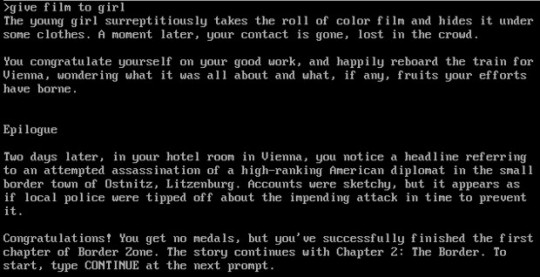
I know this screenshot is different from the previous screenshot! But the Apple IIe copy I found crashed when you examined your clothes or photographed the document. And the Commodore 64 version seems to think people who play Infocom games are already wasting their lives so why not make every move take an interminable amount of time. So I wound up playing the browser MS-DOS version on Archive.org.
For an Infocom game, that first chapter was simple! All you had to do was act like a boring idiot who totally wasn't involved in political espionage at all and you succeeded! I bet every nerd who tried their hand at this game beat Chapter One. But the next chapter will be different because the player takes on the part of the American spy! What greasy nerd knows how to act suave and sophisticated and super sexy? I mean aside from me! I was born to play this role!
CHAPTER TWO
You begin the story of the American Spy after he falls from the roof of the train. He claims he jumped for it but when I was the businessman, I know what I saw! I'm a clumsy oaf! I mean he's a clumsy oaf! No, wait. I guess I am the clumsy oaf! And I'm not clumsy at all! I totally jumped for it and looked hot doing it. Now I just have to survive the freezing weather and try to get past the border patrol or else I'll die out here in the ... BORDER ZONE!
Hopefully I'll also get another chance to fight my rival Viper to the death! Ew, I'll show him! Or her!
Or not! After playing this chapter for about ten minutes, I realize it does every single thing I don't like in text adventures: time limit, characters that go about their business while you're off in other areas, and a puzzle that relies on knowing so much about the timeline that you have to play the scenario dozens of times to work it all out. I feel like I've got the gist of what you have to do (although I'm probably wrong on one key point because I haven't played more than a handful of times) but I'm not sure I'm willing to keep at it. After you bail from the train, the border guards begin searching for you. So you've got some guys in a vehicle driving around and a pack of dogs (not to mention the searchlights and fences at the border) hunting you down. Early on, you have to get to a small house because it has a parka in it to keep you from freezing to death. You have to time this with when the guards arrive to talk to the owner so he's distracted while you sneak in the back. There might be more to do inside the shack other than gather up all the crap in the storage room but, as I mentioned, I haven't really explored the scenario yet in multiple ways.
As a spy, you have an explosive pen on you. It has a timer which means I have to figure out how long to set the timer for and where to stick the pen to get something further in the story to happen. I feel like I have to stick it on the guard's automobile so that it explodes near the border, distracting the guards at the spotlights so I can make a run for the other side. Realizing that that might be the solution is what has really made me dread continuing with this game.
Another puzzle is to get the dogs to stop following you. I'm fairly certain you do that just by putting on the work boots and trudging through the swamp a ways before leaving the swamp in a new location and leaving the boots behind.
If there are any other puzzles (aside from staunching your bleeding gun shot wound), I haven't found them. I suppose the biggest one is sneaking about to get the pen on the guard's car and figuring out how long to set the timer for. Do I want to bother with that? I feel like that's the big puzzle that allowed Infocom to tack on hours and hours of gameplay to Border Zone. Because now I have to follow the car around to see where it goes and how long I'll need to set the timer for and where I'll need to be when the pen blows up. I have other things to do with my life, Marc Blank! I mean, they're not very important things. But they're things I'd rather be doing than messing around with the timer on my imaginary explosive pen! I'm not cut out to be a spy, especially when that spy has to know things he couldn't possibly know on the first playthrough of this game. Does Marc Blank know how real life works?!
Oh, your argument is that this is a game and not real life and that maybe I should chill out about it?! Well if this game is a game and not real life, why the fuck does everything keep moving along even when I'm not entering any commands?! Who wants to play a text adventure like that?! Even Bioshock doesn't demand that kind of effort out of the player. Bioshock is the only other game I could come up with. It isn't even a fair comparison. If Border Zone were a first person shooter, I'd absolutely finish this chapter! I could see the guards moving and physically hide from them. I could observe how everything moves in the game by following them around. But in a text adventure, it's fucking impossible. Sure, the game tells me if the dogs are to the north or the west. But when I'm hiding behind the shack, it sure would be a lot easier to figure out what I'm doing if I could see the guards interacting with the owner of the shack and milling about searching the premises! I don't think my imagination is good enough to handle this bullshit tension. I'm so fucking stressed out right now!
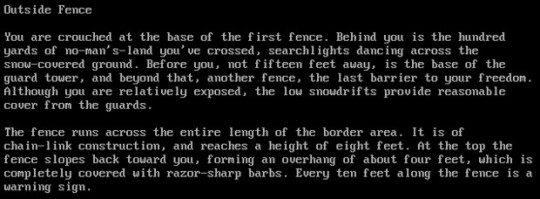
Apparently you can get close to the border without doing any of the stuff I previously mentioned except stealing everything from the storage room.
It doesn't seem like I've done enough before getting to the border but I guess I should explore this area a little more before writing Marc Blank a letter about how terrible some of his decisions were early in his career. I suppose I need to use my explosive pen here to blow a hole through the fence which I won't be able to climb through because the guards will hear it. Unless I time the explosion to blow when both guards are at the same spot, killing them? Then can I rush through in the chaos?! Figuring out the answer to that means doing math, I bet! That's because you get a timer and a little ASCII display of the guards' motion as you watch them. This is way too hard! I miss the Infocom days when you could just type "kill thief with sword" and hope the random number generator gave you a good result.
Once you get through the fence, you can climb up a guard tower where there's a bolted ladder leading up to a locked door with a guard inside. But even if you can hide on the metal bit bracing the ladder, knock on the door, and shove the stupid guard off of the tower, you still can't jump across the border from the top of the tower. You just wind up dead. Which is when I thought, "Hey! I need the exploding pen for this part! I bet I can just climb over the fence and save the explosives for this scene!" And I was almost completely and absolutely right except for a few small details which would have frustrated the fuck out of me if I hadn't gotten completely lucky on restarting Chapter Two to try out my new solutions.
You see, there's a small shed in the forest near the shack. A small shed that is almost impossible to find due to my apathetic attitude toward mapping Border Zone and the way every location is described as "You move 100 yards north and find you're still in the snowy forest. What did you expect, jerk?!" Sure, the shed has been drawn on the map that came with the game so that people who actually purchased Border Zone would have explored long enough to find it. And I have access to that map because everything is free on the Internet. Right? Am I making a terrible assumption there? Um, anyway, when I restarted, due to not having mapped, I couldn't remember exactly how to get to the shack before the guards got there. While stumbling around lost, I found the shed with the rubber gloves and bolt-cutters inside. And like in most text adventure games that aren't Infocom, the main puzzle was simply finding the right items where they were hidden. Because as soon as I found the bolt-cutters, I knew I had this chapter beat.
What I didn't know was that the border fence I'd previously blown up to get through was electrified! Luckily, I had found the rubber work gloves right there with the bolt-cutters. Marc Blank practically gave that puzzle's solution away for free! Idiot. He should have hid the gloves somewhere in the forest where you weren't ever clued in to dig in the snow. That's more like a proper 80s text adventure! Of course, that's not Infocom's way! Infocom wants you to succeed! They want you to realize you wasted the pen explosive and needed a new solution where you use the pen to blow up the tower so that it falls over the border fence with you inside of it! But at least in the actual solution, you still get to push that stupid Frobnian Nazi off of the tower. Eat snow, grumblebutt!
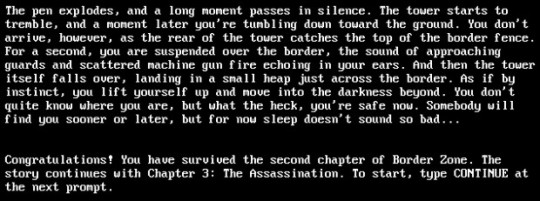
I'll accept my Champeen of Infocom crown now.
Chapter Three
The first two chapters were way too easy for Infocom games so I'm really nervous about this third chapter. Have I just gotten more brilliant as I've grown older or did Marc Blank save all of his dreadful Infocom ingenuity for this final chapter?! Hopefully this chapter doesn't have dozens of NPCs whom I've got to track across multiple playthroughs just to figure out where I should be every minute of the scenario. I really do prefer text adventure games with static environments that simply react to the things I do. I'm already stressed out thinking about my race against the clock to save the ambassador! Remember when I didn't even care if the ambassador died during the first chapter?! Why am I suddenly invested in saving that asshole?!

In this chapter, I'm the sexy double agent!
The sexy double agent is also — and this is a huge spoiler for all you Infocom fanatics who just haven't, for some reason, gotten around to playing all of the Infocom games — Viper, the man in the trench coat trying to get the documents back from the importer/exporter in the first chapter! If that's the case, you'd think I could just go to a coffee shop and hang out for the rest of the game. If I'm trying to stop the people trying to stop the assassination, then can't I just stop trying to stop those people so they can stop the assassination?! Maybe if I just hit "z" and "enter" until this chapter ends, everything will work out for the best!
Seventeen in-game minutes later, the ambassador has been shot and killed. What the fuck?! How incompetent are the American spies? I guess that's why I'm a double agent. Because I'm double the agent all of these other jerks are. I guess I need to get to work saving the day all by myself! If only that stupid American businessman had given me the documents, I could have saved the day myself. Except when I did get the documents in Chapter One, the game still ended with the ambassador getting assassinated. I should just get on with saving the day already. I bet when I'm done, I'll run into Topaz (that was my secret agent name in Chapter Two, apparently) and we'll share a deep, passionate kiss.
I do run into Topaz chilling at a coffee shop exactly like I was planning to do!
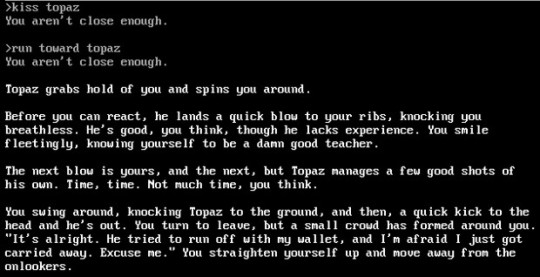
I guess Topaz doesn't feel the same way that I feel about him.
Topaz is probably still important to the story, so I decide to leave him alone for now as I got about my double agent business of stopping the assassination that I put into place. It's actually not too hard to do if I don't mind sacrificing the rest of my double agent career. I meet my contact, learn the sniper's password, figure out what window he's sniping out of (by checking the apartment directory, you just have to find which eastern facing apartment is empty on the fifth floor (maybe other floors at time but it always seemed to be the fifth floor on my multiple restarts), and go shoot him in the back. But that puts a lot of suspicion on you and you wind up pushing papers in Siberia. Better to trick Topaz into stopping the assassination! I guess that's why you have to save his life in Chapter Two.
To do that, you have to get him to chase you back to the sniper's nest without getting caught by him or the local police. At one point, you get to push over a hot dog vendor's cart so it really feels like you're in an action movie and also that you're a fucking prick. Once you lead Topaz back to the sniper, the difficult part was not also being killed by Topaz. After making him a huge hero, he kept shooting me in the face because he's a huge bastard whom I wish I never helped cross the border now! At first I thought, "Well, this is an Infocom game. It was bound to get difficult at some point! And I guess one or two moves away from completing the game is as good a time as any to get stuck." But then I thought, "Well, even though the sniper doesn't let me move or do anything, and the sniper's apartment is completely bare, maybe I can try to hide so Topaz doesn't fucking murder me when he kicks in the door?"

Oh fuck. Easy as that, was it?!
And with that final move to hide in plain sight, I fucking defeat Marc Blank! You stupid son of a bitch! You thought you were so clever, didn't you? "Oh, look at me! I'm an Infocom imp! I write the hardest text adventure games in the world and I only mattered for like four years in the mid to late eighties because I hitched my star to the most boring entertainment ever! Only stupid virgin assholes would keep playing the games I wrote, the dumb bastards!"
Hey! Fuck you, Marc Blank! How did that Marc Blank imaginary soliloquy get away from me so badly?! Anyway, suck on this, Marc:
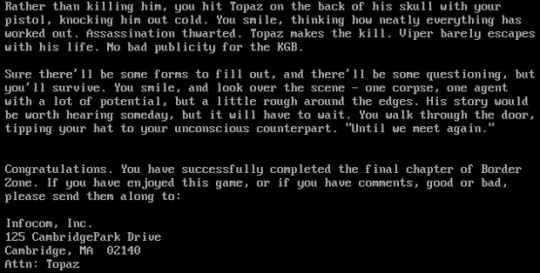
Seriously though. I can't believe I beat this game without any hints. I'm fucking chuffed.
SCORES
Game Title: Not great since it basically drove me away from this game for years. I suppose if you're into espionage stories, it's a great title because it's so evocative of crossing a border! That's like the hardest challenge in the espionage genre! I think. I'm not a fan so what the fuck do I know? My favorite espionage movie is Run, Lola, Run. Does that count as espionage? I guess that's more heist fucks time travel while fingering romance's anus.
Puzzles: As far as modern day Interactive Fiction "rules" go, the puzzles in Border Zone are terrible. Nearly all of them rely on playing through and losing dozens of times to see how the NPCs react to different situations. It's the only way to learn how they behave so you can act accordingly. But compared to a non-Infocom game, the puzzles were generally satisfying. Because of the way the game works, I'm not even sure some of the things I did were solutions to puzzles or just wasting my time. Did I have to go through the swamp to lose the dogs or could I have just done everything quicker? Were there alternate ways to solve puzzles or were things like the binoculars and the wood saw in Chapter Two just red herrings? Generally, once I saw the way the other characters reacted, it was long before I figured out how to thwart them. I believe Marc Blank was relying on some puzzles to be difficult due to the player losing track of the story. Like in Chapter One, you can get all the way to the end and still get caught when you try to pass the documents to your contact because you were wearing the stupid white carnation the entire time. But once you realize you seem to have done everything correctly and some guy on the platform is still following you, it's not hard to realize you need to not stand out and to keister that stupid flower until you actually need it.
Gameplay: Fucking annoying. I hate adventure games where the story continues no matter what you do. I hate timed adventure games. Border Zone decided not only to use those two aspects I hate but to invent a third one that — Hey! Guess what?! — I hated even more: time passes even when you're not typing! Is there a word that means both "innovative" and "Goddamned fucking annoying as fuck"? Whatever it is, Marc Blank should copyright it.
Graphics: Normally for a text adventure, I'd say none and be done with it. But this one did have graphics! It had a little ASCII bit to show two guards marching around the base of three towers! And it absolutely did nothing for me because the dumb guards barely even notice you when you cut through the fence silently instead of blowing a huge hole in it. Hell, even after blowing a hole in the fence, the idiots keep to their regular patrol only slightly more alert due to hearing an explosion.
Concept: I think I more than adequately covered my apathy toward the concept. I will compliment Marc Blank for his work in making a game about a really stressful experience into a really stressful experience. Good job, jerk!
Fun Time: I keep forgetting to track the amount of time it takes me to play these games. Maybe I'll get better at it eventually. But I think I spent maybe six hours (at most. I might even drop that to four or five) playing this game over the last week and a half? I did think about it more than that though. But not a lot more. And the third chapter which I thought would be dreadfully hard took the least amount of time of all. Probably not even an hour. The good news is that the amount of "fun time" I had with this game is equal to the amount of time I played it. That doesn't often happen. Usually the "fun time" gets expended quickly and I force myself to trudge through the rest of the game, adding the experience to the long list of things I'll regret when a doctor finally says to me, "You have three months to live due to your malignant finger cancer caused by typing."
2 notes
·
View notes
Text
New Post has been published on Irene North
New Post has been published on http://www.irenenorth.com/writings/2017/12/my-2017-reading-list/
My 2017 reading list
Every year, I make a list of the things I read – books, long articles, graphic novels – and share them. Hopefully, you will find something interesting to read here and expand your mind.
To make it easier in case you don’t like one type of reading, I created sections for each type of reading and then listed in the order I read them.
BOOKS
The Healing of America: A Global Quest for Better, Cheaper, and Fairer Health Care by T.R. Reid
Does a wealthy country have an ethical obligation to provide access to health care for everybody? Do we want to live in a society that lets tens of thousands of our neighbors die each year, and hundreds of thousands face financial ruin, because they can’t afford medical care when they’re sick? This, of course, is the “first question” that Professor William Hsiao asks whenever he reviews a country’s health care system. And on this question, too, every developed country except the United States has reached the same conclusion: Everybody should have access to medical care.
– Pg. 242
Though the question comes near the end of the book, it is researched throughout. Reid looks at the different models used around the world – Bismark, Beveridge, National Health Insurance, Out-of-pocket. If you want to understand health care, you should read this. You will learn there are very good, working models around the world that the United States could use or adapt so everyone has access to care.
Quiet by Susan Cain
There’s a reason this book is a best seller. It provides new insights into introverts and can also be beneficial to extroverts to learn about and understand their friends, family, and coworkers.
Pay Any Price: Greed, Power and Endless War by James Risen
Most of what Risen writes about was not new to me. I had read the stories in other books, newspapers and magazines. By, if you want to know what goes on in Washington, D.C., you need to read this book. It covers everything the United States government has done wrong since 9/11 and shines a light on the many abuses of power of the American government under the cloak of “providing security” and making American safer.
Red Notice: A True Story of High Finance, Murder, and One Man’s Fight for Justice by Bill Browder
One of the best books I read this year. I could hardly wait to get home from work each day to continue reading the book.
There are two stories here. First is Sergei Magnitsky’s life and death and second is the corruption and murder in Vladimir Putin’s Russia.
Browder recounts his journey to becoming the founder and CEO of Hermitage Capital Management, the largest foreign investor in Russia until 2005. When his lawyer, Sergei Magnitsky, was murdered in prison for uncovering hundreds of millions of dollars in fraud by officials in the Russian government, Browder became vocal about human rights abuses in the country.
Actually, I’m surprised Browder made it out alive.
America’s First Great Eclipse: How scientists, tourists, and the Rocky Mountain eclipse of 1878 changed Astronomy forever by Steve Ruskin
I interviewed Ruskin before the solar eclipse that passed through Nebraska on Aug. 21, 2017.
As easy read that can be accomplished in a day or two, the book discusses the solar eclipse of 1878, including emerging technologies that allowed scientists to better view the sun as well as citizen scientists helping out and the sheer joy surrounding the event.
It’s only $8.99. Pick up a copy and lose yourself in the joy of a total solar eclipse.
Planck: Driven by vision, Broken by War by Brandon R. Brown
Max Planck is considered the father of quantum theory. He was good friends with Albert Einstein. And he was German. Planck stayed in Germany after World War II broke out. He spent his life fighting the fact that he did not think as his government did, but was compelled to remain in the country.
I get a lot of book recommendations from the science and history subreddits on Reddit. This one was highly recommended. However, I found myself slogging through the book, feeling like I had to finish it because I bought it. It was a chore that needed to be done.
There is no doubt. Planck is an influential scientist and more should be known of him. If you’re a fan of Planck, this will probably be a fun and interesting read. It just didn’t do anything for me.
They Fought Like Demons: Women Soldiers in the Civil War by DeAnne Blanton and Lauren M. Cook
I think I read too much because a lot of these stories I already knew.
The book covers a part of Civil War history that isn’t covered nearly enough – that of the women who fought in the war. Hundreds of women fought in the war by disguising themselves as men. The book explores their reasons for enlisting, and staying, as well as their combat experiences and what their fellow soldiers thought of them.
Each of the women in the book could have biographies of their own. Some probably would, if they had been men.
A well-researched book on a topic not many people know about.
Paper Tiger: An Old Sportswriter’s Reminiscences of People, Newspapers, War, and Work by Stanley Woodward
https://www.amazon.com/Paper-Tiger-Sportswriters-Reminiscences-Newspapers/dp/0803259611
I really enjoyed this book. I’m not a big fan of sportswriting and I don’t read much of it today, but this book is so much more than that. Woodward is considered one of, if not the, best sports editor to have ever held the position in America. Throughout the book, he discusses the problems within a newspaper, many of which still plague the industry today.
One day, toward the end of my vacation in 1955, I received a letter from Mr. Welsh, my managing editor. He said that I was a wonderful operator but that my salary was too high for the News and therefore I was fired. I can’t say I was terribly distressed, for I wanted to get North not only because I hated the South but also because I was afraid one of my girls might marry a Floridian. God knows enough of them were hanging around the house.
– Pg. 261
It doesn’t make any difference to me what happens to the newspaper business; that is, it doesn’t make any difference to me economically. But I can’t bear the thought of a general newspaper collapse. For I still believe what Nick Skerrett told me when I was a cub reporter – “The American newspaper is the greatest institution in the world.”
– Pg. 286
Woe is I by Patricia T. O’Conner
Need to brush up on your grammar? Check out this book. I’m still probably never going to get the “that vs. which” thing right. But that’s why I have a copy editor.
Walking with the Wind: A Memoir of the Movement by John Lewis
https://www.amazon.com/Walking-Wind-Movement-John-Lewis/dp/1476797714/
Senator John Lewis recalls his life and journey to Washington, D.C. It is an important story about the Civil Rights Movement and one everyone should read.
“There is an old African proverb: ‘When you pray, move your fee.’ As a nation, if we cre for the Beloved Community, we must move out feet, our hands, our hearts, our resources to build and not to tear down, to reconcile and not to divide, to love and not to hate, to heal and not to kill. In the final analysis, we are one people, one family, one house – the American house, the American family.”
– Pg. 503
Extract from a Diary of Rear-Admiral by Sir George Cockburn
https://archive.org/details/extractfromadia00cockgoog
Another recommendation from Reddit.
The full title is a mouthful: Excerpt from Extract From a Diary of Rear-Admiral Sir George Cockburn: With Particular Reference to Gen. Napoleon Buonaparte, on Passage From England to St. Helena, in 1815, on Board H. M. S. Northumberland, Bearing the Rear-Admiral’s Flag.
This manuscript was found in Cockburn’s own handwriting among his other writings. It was published due to its intrinsic value to history about the late career of a soldier.
Cockburn was there when the White House was burned and was chosen to escort Napoleon to Saint Helena for exile. Though Cockburn would later die at Saint Helena, this is his journal of the voyage there.
Minatare Memories: A Historical Account of the Tabor-Minatare Community of Western Nebraska by the Minatare Historical Committee.
A history of Minatare, Nebraska. I came across some ladies documenting the history of Minatare. They planned to write a book when they were finished, charging only what it cost to have it printed. I wrote an article about them. Then, I wrote another when the book came out. U.S. News and World Report picked up my story. I didn’t plan on it, but I’m on page 139.
After printing, the ladies noticed a few typos and they received even more information than what they had. I know how that feels.
Black Hills Doc 1892-1945 by C.W. Hargens, M.D., Edited, by D.M. Hargens-Hallsted.
This is the story of an instrumental figure in the history of Hot Springs, South Dakota. D.M. Hargens-Hallsted, or as I know her, Dorothy Waldren, brings her grandfather’s story to life.
This is a great and easy read to learn about how life was along the frontier. It tells the story of Dr. Hargens from his early life in the Missouri Valley teaching to becoming a doctor to settling in Hot Springs where he helped transform the city.
Tales in the book include his thoughts on how women should be treated and the “discipline” men received when women were bullied, a run in with Calamity Jane and enforcing the use of masks in public during the Influenza epidemic of 1918.
A novel feature of Kidney Park was a contribution box, urging patrons to drop a coin in order that good works might be carried on. The box was attended daily by the Chief of Police; we overlooked no possible source of contributions, even to having the night cop sit on a chair observing the late night comings and goings from certain establishments, a report culminating in an early morning call for a donation or perhaps an invitation to leave town on the next train.
– Pg. 141
These dances by the Indians, with shuffling feet and synchronous movements and the songs in a plaintive monotone, brought to the sympathetic viewer visions of a western scene never to be forgotten but later to be tarnished by the restrictions and degradation of reservation life.
– Pg. 144
The Battle of Wounded Knee had occurred on the Pine ridge Agency in December of 1890 and was a massacre of Indians by the Seventh Cavalry. The Indians’ presence there was attributed to the Custer massacre, the current Messiah craze among the Sioux and the mistreatment of Big foot’s band by the whites. The Indian warriors wore “ghost shirts” which they had been told would magically protect them against the bullets of the white man. Victims of this fallacy were buried in their shirts except for a few shirts taken as souvenirs by those handling the bodies.
– Pg. 146
I have always admired the Indians use of his environment; the religious and moral convictions which abhorred waste of any part of the animals he hunted, particularly the buffalo; his early use of the horse, his reverence of the Black Hills as an abode of the ruling spirits of his people. Any white man who claims superiority to the Indian because the Indian was defeated by an advanced armament is deluded. White men in no way, mentally, morally or physically are superior to the Indian. We defeated them only because of the “advantages” of a more developed science.-
– Pg. 188
The Indian believed profoundly in silence, the sign of perfect equilibrium. Silence is the absolute poise or balance of the body, mind and spirit. The man who preserves his silence ever calm and unshaken by the storms of existence, not a ripple on the shining surface of the pool, not a leaf stirring on the tree, that man, in the mind of the unlettered safe, is in the ideal attitude and conduct of life.
– Pg. 188
This is a fascinating read. If you’d like a copy, the best way would be to call Dobby’s Frontier Town and they can put you in touch with Dorothy. Alternatively, you can pay way too much for it on Amazon.
This Blessed Earth: A Year in the Life of an American Family Farm by Ted Genoways
Genoways follows Rick Hammond and his family from harvest to harvest where they raise cattle and crops on Hammond’s wife’s fifth-generation homestead in York County, Nebraska.
The book goes back and forth between the struggles of the Hammond family and the future of family farming to the history which got us here.
As the family fights to keep their operation afloat, they must deal with a myriad of issues, including the Keystone XL pipeline and the ever-increasing demands of security precautions put into place from DuPont Pioneer for the transportation and planting of seed to the ultimate harvest.
Far from an isolated refuge beyond the reach of global events, the family farm is increasingly at the crossroads of emerging technologies and international detente.
If there’s one thing I learned from this book, it’s that I don’t ever want to be a farmer. If you know nothing about corn, soybeans, and modern farming in Nebraska, this is the book you want to read. Genoways weaves the Hammonds story into complex issues without ever making the reader feel overwhelmed with information.
When I finish reading a book, I usually pass it on to others. I’m keeping this one and recommending you all go get your own copy.
Longer readings
The Things by Peter Watts
Have you seen the movie “The Thing” and wondered what the thing was thinking? Now you can read what it thought of us.
I Just Wanted To Survive by Tisha Thompson and Andy Lockett
A college football player thought he and a friend were going to meet up with two women. Instead, they were abducted and tortured for 40 hours — all because of a teammate.
How American Lost Its Mind
The nation’s current post-truth moment is the ultimate expression of mind-sets that have made America exceptional throughout its history.
This article was adapted from Kurt Andersen’s book Fantasyland: How America Went Haywire—A 500-Year History.
The First White President
The foundation of Donald Trump’s presidency is the negation of Barack Obama’s legacy. The essay was drawn from Ta-Nehisi Coates’s book, We Were Eight Years in Power.
Interview with Edward Snowden by Martin Knobbe and Jörg Schindler
In an interview, whistleblower Edward Snowden discusses his life in Russia, the power of the intelligence apparatuses and how he will continue his battle against all-encompassing surveillance by governments.
Jesus as Whippersnapper: John 2:15 and Prophetic Violence by Hector Avalos, Professor of Religious Studies, Iowa State University
This essay challenges a pacifistic interpretation of John 2:15. In particular, it addresses the linguistic, historical and literary arguments of N. Clayton Croy, who argued that Jesus should not be portrayed as committing any act of violence in John 2:15. More recently, Andy Alexis-Baker concludes that Jesus did not even strike any animals with a whip, which was made of materials too soft to injure anyone or any animal. A violent portrait of Jesus is consistent with the Deuteronomistic view of divine anger and prophetic zeal that may have influenced the portrait the Johannine Jesus. Otherwise, the temple episode in John exemplifies another case where some streams of Christian scholarship seem reluctant to characterize Jesus’ behavior as unjustifiably violent.
The Danger of President Pence by Jane Mayer
Trump’s critics yearn for his exit. But Mike Pence, the corporate right’s inside man, poses his own risks.
How the Elderly Lose Their Rights by Rachel Aviv
Guardians can sell the assets and control the lives of senior citizens without their consent—and reap a profit from it.
A Generation in Japan Faces a Lonely Death by Norimitsu Onishi
The New York Times examines the growing problem of forgotten senior citizens in Japan. The story follows two apartment residents who eat lunch together in a retirement community in the suburbs of Tokyo. They have outlived nearly all their blood relatives and are simply ignored or forgotten by the rest.
Who Gets to Live in Fremont, Nebraska? by Henry Grabar
A new Costco plant could save the town—by bringing hundreds of immigrants to the only place in America that passed a law to keep them out.
This massive Twitter thread about the 2016 election and True Pundit is a pro-Trump fake news site that began publishing on June 9, 2016 by Seth Abramson
“It’s time to tell the biggest untold story of the 2016 election: how a cadre of pro-Trump FBI agents and intel officers—some active, some retired—conspired to swing the election to Trump. The story involves Flynn, Prince, Giuliani, and others. Hope you’ll read and share.”
Is This Genocide? by Nicholas Kristof
Survivors describe Myanmar soldiers killing men, raping women and burning babies in a Rohingya village.
From the article:
“Ethnic cleansing” and even “genocide” are antiseptic and abstract terms. What they mean in the flesh is a soldier grabbing a crying baby girl named Suhaifa by the leg and flinging her into a bonfire. Or troops locking a 15-year-old girl in a hut and setting it on fire.
The children who survive are left haunted: Noor Kalima, age 10, struggles in class in a makeshift refugee camp. Her mind drifts to her memory of seeing her father and little brother shot dead, her baby sister’s and infant brother’s throats cut, the machete coming down on her own head, her hut burning around her … and it’s difficult to focus on multiplication tables.
“Sometimes I can’t concentrate on my class,” Noor explained. “I want to throw up.”
An honest, dark, and moving piece about what is happening to the Rohingya and whether it should be considered genocide. Yeah, it’s genocide. Go read the article anyway. It tells of the brutality the Rohingya have suffered and the indifference the world and those in Burma seem to have about them.
Burmese politician Daw Aung San Suu Kyi, who won the Nobel Peace Prize and the defacto leader in Burma[http://www.bbc.com/news/uk-41139319], continues to defend the army. She has called reports of sexual assault by soldiers as “fake rape” and, essentially, believes there is an “iceberg of misinformation” about the Rohingya.
It is a graphic and harrowing account of what the Rohingya have been forced to live through. If only we would listen, and take action.
A journey through a land of extreme poverty: welcome to America by Ed Pilkington
The UN’s Philip Alston is an expert on deprivation – and he wants to know why 41m Americans are living in poverty. The Guardian joined him on a special two-week mission into the dark heart of the world’s richest nation.
Alston’s journey takes him into the “dark side of the American Dream,” where the richest country in the world is also the host to abject poverty.
The two men carry on for block after block after block of tatty tents and improvised tarpaulin shelters. Men and women are gathered outside the structures, squatting or sleeping, some in groups, most alone like extras in a low-budget dystopian movie.
We come to an intersection, which is when General Dogon stops and presents his guest with the choice. He points straight ahead to the end of the street, where the glistening skyscrapers of downtown LA rise up in a promise of divine riches.
Heaven.
Then he turns to the right, revealing the “black power” tattoo on his neck, and leads our gaze back into Skid Row bang in the center of LA’s downtown. That way lies 50 blocks of concentrated human humiliation. A nightmare in plain view, in the city of dreams.
Alston turns right.
There are many great points in the article, including this:
The link between soil type and demographics was not coincidental. Cotton was found to thrive in this fertile land, and that in turn spawned a trade in slaves to pick the crop. Their descendants still live in the Black Belt, still mired in poverty among the worst in the union.
You can trace the history of America’s shame, from slave times to the present day, in a set of simple graphs. The first shows the cotton-friendly soil of the Black Belt, then the slave population, followed by modern black residence and today’s extreme poverty – they all occupy the exact same half-moon across Alabama.
As one gentleman in the article said, “The safety net? It has too many holes in it for me.” These are people who are in despair and America turns a blind eye to it, preferring to believe people cause themselves to be in these situations when that is far from reality.
Where Wind Farms Meet Coal Country, There’s Enduring Faith in Trump by Clifford Krauss
Hoping for more unfettered production of coal, oil and gas even as it erects wind farms, a Wyoming county sees the president as a key to job security.
The Making of an American Nazi by Luke O’Brien
How did Andrew Anglin go from being an antiracist vegan to the alt-right’s most vicious troll and propagandist—and how might he be stopped?
This is a really long read, but a good one and a damned fine piece of journalism. This is why I have a subscription to The Atlantic.
On December 16, 2016, Tanya Gersh answered her phone and heard gunshots. Startled, she hung up. Gersh, a real-estate agent who lives in Whitefish, Montana, assumed it was a prank call. But the phone rang again. More gunshots. Again, she hung up. Another call. This time, she heard a man’s voice: “This is how we can keep the Holocaust alive,” he said. “We can bury you without touching you.”
When Gersh put down the phone, her hands were shaking. She was one of only about 100 Jews in Whitefish and the surrounding Flathead Valley, and she knew there were white nationalists and “sovereign citizens” in the area. But Gersh had lived in Whitefish for more than 20 years, since just after college, and had always considered the scenic ski town an idyllic place. She didn’t even have a key to her house—she’d never felt the need to lock her door. Now that sense of security was about to be shattered.
There are also these unsettling things in the article:
In the summer of 2015, another great white savior—himself a troll—appeared to Anglin, this time gliding down a golden escalator in Manhattan in front of a crowd of paid extras.
Anglin immediately put all his resources toward willing a Trump presidency into reality. He churned out cheerleader posts and deployed his trolls on behalf of Trump, directing several of his nastiest attacks at Jewish journalists who were critical of the candidate or his associates.
His absentee ballot arrived in Ohio from Krasnodar, a city in southwest Russia near the Black Sea, according to Franklin County records.
Anglin worshipped Putin, and seemed like exactly the type of online agitator Russia might use to sow chaos during the U.S. election.
Also from Whitefish: Ryan Zinke, Richard Spencer and Whitefish Energy, the two-employee company who were originally given the no-bid contract to restore power to Puerto Rico. I suspect we will hear more about Whitefish in 2018.
O’Brien also did an NPR interview about the article and his findings.
Graphic Novels
No Girls Allowed: Tales of Daring Women Dressed as Men for Love, Freedom and Adventure By Susan Hughes
https://www.amazon.com/No-Girls-Allowed-Dressed-Adventure/dp/1554531780
This is a great little graphic novel geared toward children under twelve. Within its pages, you’ll discover women throughout history have had important roles, including viking, pharaoh and general in the Kahn’s army.
It also covers topics, such as women disguising themselves as men and why they needed to do so. Most the these women risk it all, including their lives to pursue their dreams.
A User’s Guide to Neglectful Parenting by Guy Delisle
A delightful little read. Hilarious. I say this is how you should raise kids.
The Dark North – Volume 1
The illustrated prose-art book consists of five new stories by some of Scandinavia’s premier illustrators and concept artists. Everything was well done visually and the stories were compelling. The art is what is on display here and it does not disappoint.
This is not your typical graphic novel, and it isn’t trying to be. The artists are trying something new and, for the most part, it works.
The Forever War by Joe Haldemann (Author), and Marvano (Illustrator)
Released in Belgium in 1988, the science fiction graphic novel by Marvano is closely based on the novel of the same name by Joe Halderman, who provide the dialogue. It was originally published in Dutch and later translated into several languages, including English.
The Forever War tells the story of William Mandella, an elite soldier fighting for Earth in an interstellar war, which lasted for centuries. He is one of a handful who eventually survives the entire war. Mandella eventually settles on a planet with other veterans called, “Middle Finger.”
The Forever War focuses on many themes, including the dehumanizing effects of war and the changes in society as the soldiers continue to fight.
Like Halderman’s book, the graphic novel touches on themes from the Vietnam war, such as the treatment of the enemy and propaganda.
The original was released in three volumes, but has since been incorporated into one. The art is part of the story and often enhances what is taking place. In almost every place, the art is intertwined with the story and it feels as if each pane is meant to be with the text.
The only drawback is that in a graphic novel based on a book, there will, necessarily, be cuts. If one reads the book, they will learn more about why only people with IQs above 150 were drafted, why military-approved drugs were allowed, and more about how partners were sexually assigned.
The relationship between William and Marygay is also diminished, but I didn’t feel it took too much away from the graphic novel. It may be because I have read the book so I went in with some notion of the story.
All in all, it’s a good graphic novel that I recommend, even if you’re not a graphic novel kind of person.
That’s it for 2017. I’ve already got 20 books stacked up on my desk for 2018. Happy reading and I hope you find a gem or two in my list.
0 notes
Text
399. The “Cats” round up

This week was Halloween, and this year I went as Jemima from Cats. Why did I decide on this costume? Well, seeing the trailer (and H3H3′s reaction to it) for the scary 2019 movie with those basic b’s Taylor and James made me want to see the original Cats, the good Cats.

You can watch most of the direct to VHS 1998 edition on YouTube in parts. So far, its the only musical that doesn’t bore me to tears, even if the scenes where they perform a play for Old Deuteronomy makes no sense.

You know what Cats sorta reminds me of, that old PBS show Zoobilee Zoo, especially Victoria the white cat, she reminds me of the pink kangaroo lady.
Cats came to New York City in October of 1982 after beginning a successful run in London. It was announced at the end of 1981 that the musical would be coming to New York:

Anticipation was so great that copies of T.S. Eliot’s original work was selling out:
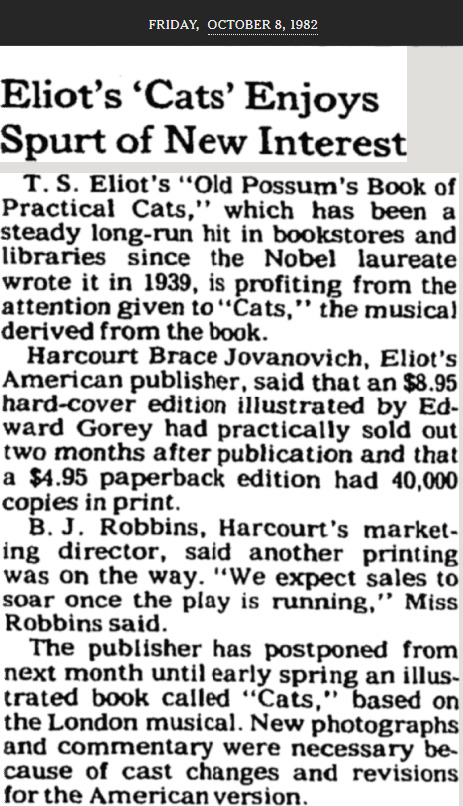

(I’m mad I can’t find this commercial)
Tickets for the show were sold months in advance, with many bulk orders:
More than six months before opening night, the Fresh Air Fund had already bought 500 seats. The Arthritis Foundation purchased 300 tickets, the Archives of American Art bought 300, and the American Red Cross bought 500 seats. Then there was the Burden Center for Aging with 300, University Settlement with 200 and the Social Service Big Sister League with 500 seats. Those are just a handful among many, but by the time ''Cats'' opened on Broadway last week such orders added up to $6.2 million in advance ticket sales. Of that sum, $4.5 million had already been collected, with only $1.7 million in contracts still to be paid in full. This could be the largest advance sale in Broadway history, according to many theater analysts. Orders began to come in more than a year before ''Cats'' - a big hit in London - finally arrived in New York, and tickets are now being sold as far in advance as next May. 2
The musical debut was also supposed to be a cover story in Newsweek, but the Tylenol murders prevailed. 2


Someone defaced the copy at archive.org.
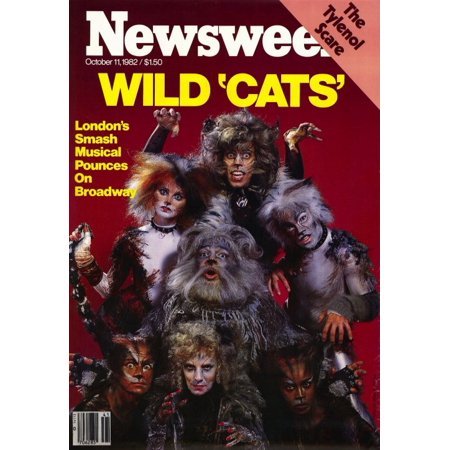
I somehow found the cover though. I wonder if this was for Canada? There are people on sketchy websites selling this as a print? The library bound Newsweek from archive.org has the Tylenol cover. I believe the woman on the bottom row, right is Janet Hubert, who played Aunt Viv the first on Fresh Prince. In Cats, she played Tantomile in the first Broadway cast.
(I made screencaps of the Newsweek article and uploaded the screencaps to the mirror site on wordpress)
As you may have noticed these Cats from the early 80s are kind of scary looking. There are several videos on YouTube of the cast performing at the 1983 Tony Awards, and there is this cat that is absolutely terrifying:

It’s the one who sings “can you see in the dark?!”. I think its Demeter, and Marlene Danielle is playing her? Marlene was an originally an understudy in 1982 and eventually played Bombularina until the end of Cats’ run on Broadway in 2000.

Here she is on Today in 1999 discussing the role and she also performs “Macavity”.
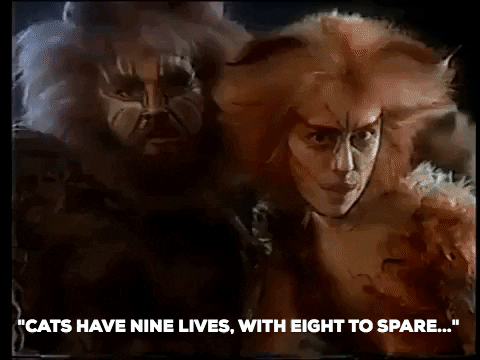
The cats of Cats became so popular in the 1980s that they were even in a No Smoking commercial.

And a seat buckle/child seat PSA! This one is really dark, I mean Memory plays at the end.

In 1984, Rum Tum Tugger became the star of his own music video. 3 I don’t know how often MTV played this--maybe it played more overseas. I remember my choir teacher in high school, Ms. Forrest showing us a VHS once of music videos from Andrew Lloyd Webber’s musicals, and she said that they were popular in the UK and shown on MTV over there. All I remember is a Phantom of the Opera remix and Requiem sung by his ex-wife.

By 1987, Celine Dion (who was still a music star in Canada, but not yet America, and sung mostly in French) sang Memory on TV.

In this clip from the short lived America’s Talking channel (later to become MSNBC) a reporter asks the cats what they did on their snow day during the 1996 blizzard. I can’t confirm this, but he says that it was the first time the show had ever been canceled. This reporter is peak 1996 in mens clothes with his bomber jacket and tie.
By June of 1997, Cats broke the record previously held by A Chorus Line of longest running show on Broadway:

Along the way to its longevity record, which applies just to Broadway shows, ''Cats'' has piled up some big numbers. It has provided employment to 231 actors, two of whom, Marlene Danielle and Susan Powers, have been with the musical since it opened. (Nineteen cast members have died.) The magical tire that carries Grizabella heavenward has clocked more than 114 miles in its nightly voyage to the Heaviside Layer. ''Memory,'' the show-stopping song that ends the first act, has been recorded by more than 180 artists. The New York production has used more than 1.5 million pounds of dry ice and 2,706 pounds of yak hair for wigs. It has sold 390,000 T-shirts, 130,000 sweat shirts, 147,000 lapel pins and 1.14 million souvenir books. 1

Also, in 1997 an audience member because she thought Rum Tum Tugger was too aggressive with her.
Related:
Original review from The New York Times
Reading Rainbow segment on Cats
Another Reading Rainbow segment on Cats, similar to the first.
Stars of the Original Cats Share Their Favorite Memories
Los Angeles news segment series on the L.A. Production of Cats.
Almost every time our boy David Letterman brought up Cats.
The Cast of CATS (2016) Meets Shelter Cats | Cats the Musical
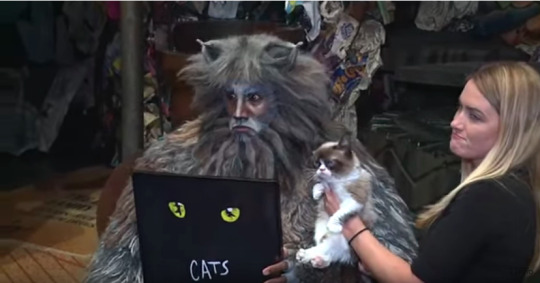
EVENT CAPSULE CLEAN - Grumpy Cat Visits The Broadway Cast of 'Cats'
Facebook | Etsy | Retail History Blog | Twitter | snapchat (thelastvcr) |YouTube Playlist| Random Post | Instagram @ thelastvcr | other tumblr | Ko-fi donation | Honey Referral
1, Grimes, William, “ With 6,138 Lives, 'Cats' Sets Broadway Mark,” New York Times, June 19, 1997. https://www.nytimes.com/1997/06/19/theater/with-6138-lives-cats-sets-broadway-mark.html
2. Bennetts, Leslie, “ HOW TICKETS TO 'CATS' BECAME A 'MUST',” New York Times, October 13, 1982. https://www.nytimes.com/1982/10/13/theater/how-tickets-to-cats-became-a-must.html
3. Kaplan, Peter W., “TV NOTES; BROADWAY FIRST: 'CATS' DOES ROCK VIDEO TURN,” New York Times, November 10, 1984. https://www.nytimes.com/1984/11/10/theater/tv-notes-broadway-first-cats-does-rock-video-turn.html
#cats#cats musical#cats broadway#broadway#1982#andrew lloyd webber#jemima#sillibub#old deuteronomy#anti smoking psas#psa#1980s#1990s#grumpy cat#grizabella
41 notes
·
View notes